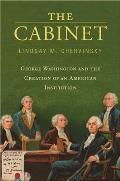The Right Way to Study the Founders
A few days ago Lindsay Chervinsky, author of The Cabinet, shared some thoughts on continuing to include the most famous Founders in the teaching of U.S. history even as we include more people in our study of the past:
That said, I’m not sure that approach would resolve the tensions of the “history wars,” Chervinsky’s starting-point. Some people equate any level of criticism of the Founders with disrespect, hostility, and, in the latest overblown buzzword, “cancellation.” Some people complain after hearing about slavery while touring Monticello, a slave-labor plantation.
We can and should teach the Founding Generation in all of its glorious complexity. Done correctly, this history is actually remarkably inclusive and helpful. Allow me to explain:I think most Americans would welcome that all-inclusive approach. Indeed, I think the best history educators and public historians use it, moving from the best known and best documented names to a fuller picture.
The Founding Generation has received a lot of heat during the last year, and rightly so. Previous approaches often glorified the Founders in ways that are incompatible with the flawed humanity we all experience. By focusing only on the rhetoric, military exploits, or political ideals of the Founders, these histories obscured the lives of women, people of color, and men in the lower economic classes.
But the Founders lived colorful, messy lives and they left records of those lives, in ways that others weren’t able to do or their records weren’t preserved because they weren’t the first president. George Washington didn’t just fight a war or serve as president. He loved to munch on nuts, spent hours foxhunting and cared little about actually catching a fox, he just wanted to be outside, and enjoyed the theater with more enthusiasm than many of his contemporaries thought appropriate.
He both included provisions in his will to emancipate the enslaved individuals he owned and spent years trying to track down self-emancipated enslaved individuals that ran away from the President’s House in Philadelphia in the 1790s. By using Washington’s records as an entry point to history, we have access to all of these stories.
Approached holistically, the Founders are very powerful symbols and offer an incredible opportunity to open conversations. Think about the life I just described. Of course, we can use Washington’s experiences to examine the military battles and strategy of the Revolutionary War. But Washington’s war experience also includes interactions with ardent abolitionist voices and Black soldiers for the first time; which played a pivotal role in forcing Washington to rethink his stance on slavery.
As commander-in-chief, Washington regularly hosted congressional delegations, visiting dignitaries, and foreign diplomats. So, his war service also tells us a lot about diplomacy, social customs, and dining practices. And of course, women were regular participants at these events, especially during the winter when officers’ wives joined them at headquarters. Just the war, therefore, offers an excellent window through which to examine American society more broadly.
That said, I’m not sure that approach would resolve the tensions of the “history wars,” Chervinsky’s starting-point. Some people equate any level of criticism of the Founders with disrespect, hostility, and, in the latest overblown buzzword, “cancellation.” Some people complain after hearing about slavery while touring Monticello, a slave-labor plantation.


No comments:
Post a Comment